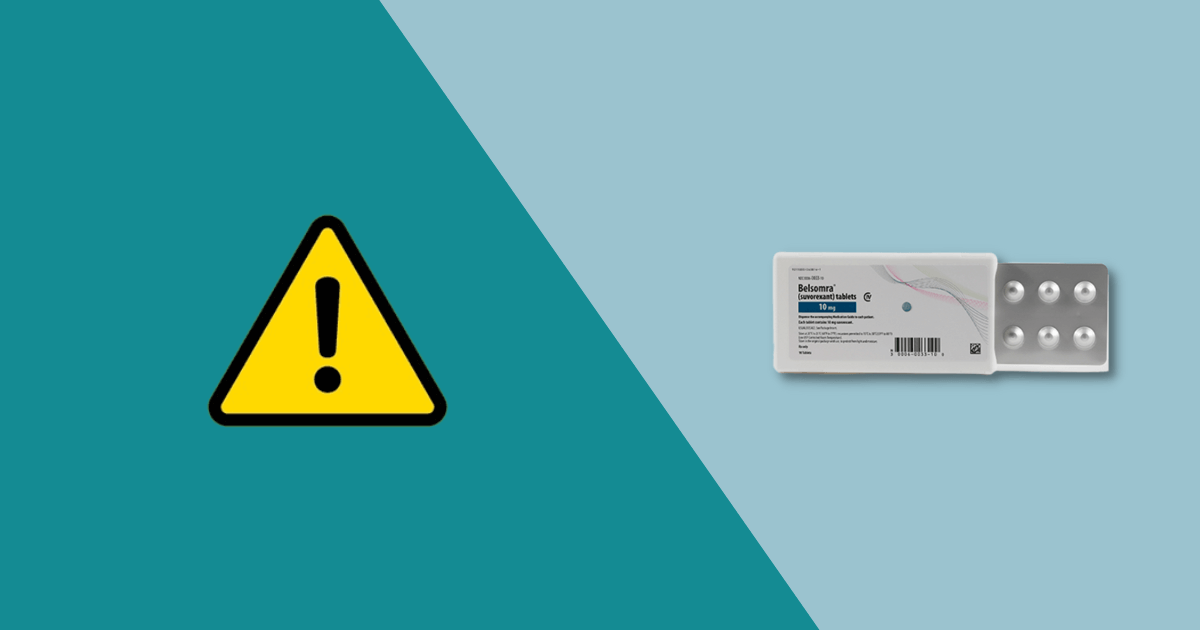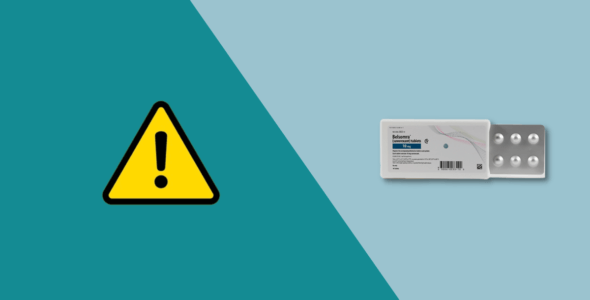Belsomra side effects and how to avoid them
Table of contents
Belsomra is an FDA-approved brand-name medication manufactured by Merck & Co., Inc. It is classified as a sedative-hypnotic and is used to treat insomnia in adults who have trouble falling asleep, remaining asleep, or both. While Belsomra is generally well tolerated, there are some potential side effects that people should be aware of. The most common side effects of Belsomra include unusual dreams. Less common but more serious side effects can include suicidal thoughts and behavior.
Learn more about the side effects of Belsomra and what you can do to avoid them.
What is Belsomra (suvorexant)?
Belsomra is an orexin receptor antagonist indicated for the treatment of insomnia, characterized by difficulties with sleep onset and/or sleep maintenance. Belsomra is a Schedule IV federally controlled substance because it can be abused or cause dependence.
Belsomra dosage
Belsomra is available in tablet form in the following doses: 5 mg, 10 mg, 15 mg, and 20 mg.
The recommended dose is 10 mg, no more than once per night. Use Belsomra within 30 minutes of going to bed, with at least 7 hours of sleep planned. The dose can be increased if the 10 mg dose is well tolerated but not effective. Do not exceed 20 mg once daily. The onset of action may be delayed if taken with or soon after a meal.
You are advised to read the medication guide provided with this medicine for the full prescribing and drug information, and patient information, and always speak with your healthcare provider for medical advice about any changes to your dose so they can monitor and evaluate your condition.
Belsomra side effects
The most common side effects of Belsomra in clinical studies compared to placebo include:
- Somnolence and sleepiness
- Dry mouth
- Daytime drowsiness – do not drive, use machinery, or do anything that needs alertness the next day
- Abnormal dreams
In rare instances, Belsomra can cause more serious side effects. These can include:
- Behavioral changes
- Worsening depression and suicidal thoughts
- Sleep paralysis – hypnagogic/hypnopompic hallucinations and cataplexy-like symptoms
- Complex sleep behaviors – sleep-driving, sleepwalking, preparing and eating food, or having sex while not fully awake. This risk increases with dose, with the use of CNS depressants, and with alcohol
- Compromised respiratory function
Your doctor will assess the benefits of using Belsomra against your risk of side effects. Patients are encouraged to report negative side effects or adverse reactions of Belsomra to the FDA. Visit www.fda.gov/medwatch, or call 1-800-FDA-1088.
What are the side effects of Belsomra in the elderly?
Elderly patients are at a greater risk of falls due to side effects such as drowsiness caused by Belsomra.
Does Belsomra cause weight gain?
Belsomra should not cause weight gain or weight loss. Speak to your doctor for medical advice if you experience changes in your weight while using this medication.
Does Belsomra cause memory loss?
Varying degrees of memory loss have been reported when using Belsomra. Speak to your doctor for medical advice if you experience this side effect.
Belsomra drug interactions
Belsomra can interact with other medications. These include:
- CYP3A inhibitors – fluconazole, ketoconazole, itraconazole, posaconazole, clarithromycin, erythromycin, nefazodone, ritonavir, saquinavir, nelfinavir, indinavir, boceprevir, telaprevir, telithromycin, fosamprenavir, grapefruit juice, imatinib, diltiazem, verapamil
- Strong CYP3A inducers – rifampin, carbamazepine, and phenytoin
- Digoxin
- Other CNS depressants such as benzodiazepines, opioids, tricyclic antidepressants, and alcohol
- Sedatives such as zolpidem
This list is not exhaustive, and other prescription drugs may interact with Belsomra. Talk to your doctor, nurse or pharmacist before taking any prescription or over-the-counter drugs (including any herbal medicines or supplements).
Belsomra contraindications
You should not use Belsomra if you:
- Are allergic to the active ingredient suvorexant
- Have had an allergic reaction to any of the other ingredients in Belsomra
- Have narcolepsy
- Are pregnant or are planning to become pregnant
- Have severe hepatic impairment
Talk to your doctor before using Belsomra if you:
- Are taking any of the medications that could interact with Belsomra
- Are breastfeeding or are planning to breastfeed – it is unknown if suvorexant passes into breast milk
- Have liver disease
- Have lung disease, or breathing problems (such as sleep apnea, chronic obstructive pulmonary disease – COPD)
- Have mental health problems
- Have a personal or family history of a substance use disorder (such as overuse of or addiction to drugs/alcohol)
- Have muscle weakness disorder (cataplexy)
- Are an older adult as you may be more sensitive to the side effects of this drug
How to avoid Belsomra side effects
The best way to avoid side effects is to take Belsomra as directed by your doctor. Follow your doctor’s instructions carefully, and do not take more or less than prescribed.
If you experience any side effects, talk to your doctor or pharmacist. They may be able to recommend ways to help reduce or prevent some of the side effects.
1. Stick to the recommended dosage
Take your prescribed dose of Belsomra recommended by your healthcare professional. Do not take more or less than prescribed.
2. Monitor your blood sugar levels
If you have diabetes, it is important to monitor your blood sugar levels closely while taking Belsomra. Check your blood sugar levels as directed by your doctor and report any changes to your doctor immediately.
3. Drink plenty of fluids
Drink eight to 10 glasses of water or fluids every day to help prevent dehydration, which can make side effects worse.
4. Avoid alcohol
Avoid drinking alcohol while taking Belsomra as it can increase your risk of serious side effects, such as central nervous system depression, and increase your risk of falling.
5. Don’t skip meals
Eating regular meals and snacks will help to prevent low blood sugar levels (hypoglycemia).
6. Check your feet
If you have diabetes, check your feet for any cuts, sores, or redness regularly. Tell your doctor if you experience any problems with your feet while taking Belsomra.
7. Monitor your weight
Belsomra may cause an increase in suicidal thoughts and behavior. If you experience these side effects while taking Belsomra, get medical advice from your doctor.
8. Tell your doctor about all medications you’re taking
Be sure to tell your doctor about all other medications you’re taking, including over-the-counter drugs, vitamins, and herbal supplements, as they can interact with Belsomra.
9. Get regular medical checkups
It is important to get regular medical checkups and monitor your medical conditions. Your doctor will monitor your side effects and may adjust your dose of Belsomra as needed.
Medically reviewed
A medical professional has reviewed this article.


Jamie Winn, PharmD
Jamie Winn, PharmD
Dr. Jamie Winn received his Doctor of Pharmacy in 2002 from the University of South Carolina College of Pharmacy, Columbia, SC. Jamie is a medical reviewer for NiceRx.


